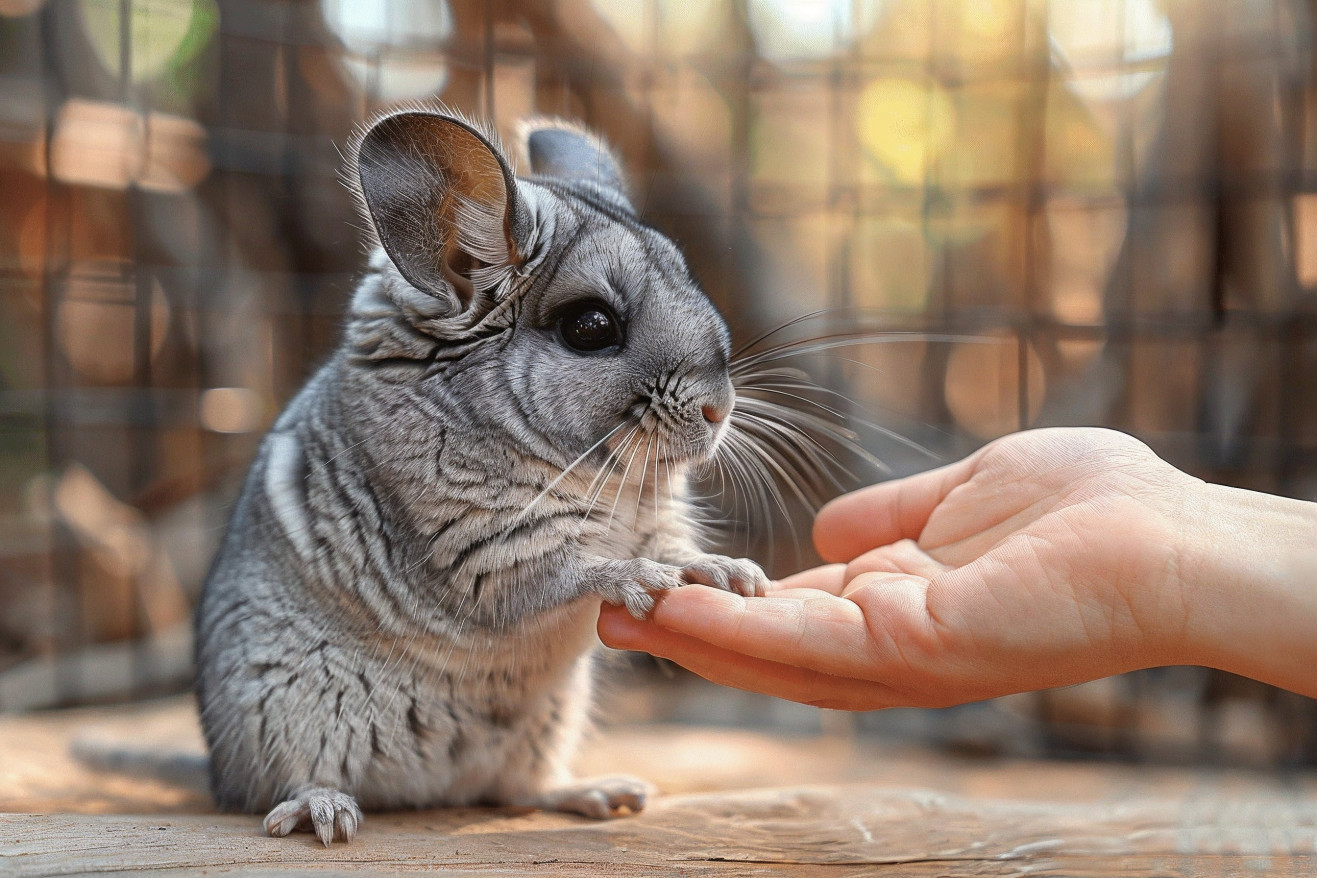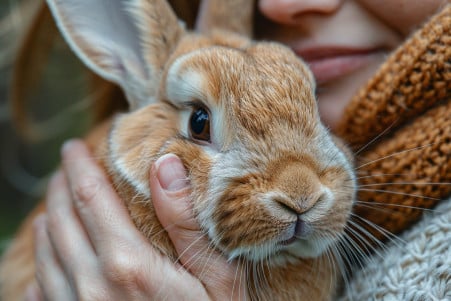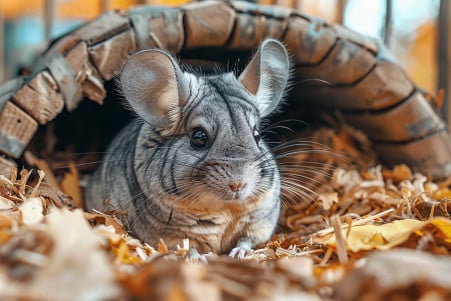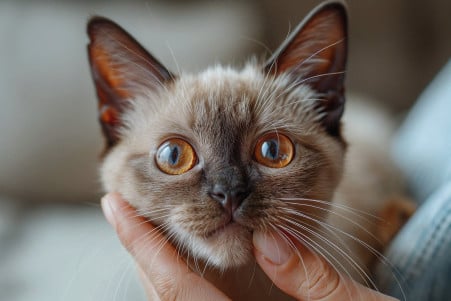Do Chinchillas Bite? Understanding Their Behavior and Prevention Tips
8 March 2024 • Updated 6 March 2024

Chinchillas are often recognized for their soft coats, but what about their not-so-soft bites? Chinchillas may bite due to stress, fear, or as a way to learn about their surroundings. While chinchillas are typically docile, they may also nip when they are being handled, especially if they have not been socialized with humans. However, socialization and an understanding of their behavior can help reduce the likelihood of biting in chinchillas.
This article will explore chinchilla behavior, drawing on research from zoological and veterinary journals that have investigated the situations in which these small mammals are most likely to bite, as well as expert insights on how to avoid these behaviors.
By looking at the studies, you will get an in-depth look at the social and environmental factors that impact chinchilla behavior and gain practical tips for handling to ensure a positive and safe interaction with these delightful animals.
Do chinchillas bite?
Why Do Chinchillas Bite? A Behavioral Viewpoint
Chinchillas express themselves and interact with their environment in a number of ways, and biting is one of the most complex. While chinchillas are typically thought of as docile animals, they can bite due to fear, especially if they are scared or in a new environment, according to Small Pet Select.
This is a defensive bite that happens when they feel their safety is threatened. On the other hand, a chinchilla can bite defensively if it feels its territory is being invaded, which can happen if someone gets too close to it or if it feels uncomfortable in its surroundings.
On a more positive note, biting can also be a form of grooming, which is a normal behavior that indicates comfort and bonding, like the allogrooming that chinchillas do with each other, according to BeChewy. In addition, chinchillas use nibbling to explore their surroundings and get to know different objects, including their human companions.
Every bite has a meaning, and it’s important for owners to understand the difference. A light nibble may mean a chinchilla is curious or showing affection, while a harder bite may indicate fear or aggression. By learning to read their body language and understanding their wants and needs, owners can build a relationship of trust and an environment that reduces these biting behaviors.
Exploring Chinchilla Social Structure and Communication
Chinchillas are social animals and prefer to live with other chinchillas. This is especially important in preventing stress-related behaviors like fur-chewing. It’s important to carefully introduce chinchillas to other chinchillas to ensure that they are compatible and will not cause stress, as Crittery points out. Their social behavior is also based on the fact that they are social animals, so if they are kept alone, they can become anxious and start to bite.
Social hierarchies are especially important in male chinchillas, with some being more submissive (Betas) and some being more dominant (Alphas), as ChinCare explains. Female chinchillas also have social hierarchies and can become territorial and aggressive if their social order is threatened.
Communication is also important to chinchillas, and they use a combination of sounds and body language to communicate with each other. This can lead to misunderstandings with humans, especially if a chinchilla is trying to communicate that they are feeling threatened or stressed. This can lead to biting. This is especially true if the chinchilla is not getting enough mental and physical stimulation.
By learning about chinchilla communication and social hierarchies, we can learn to avoid situations that may lead to biting and create positive interactions. This is not only important for chinchilla owners who want to avoid being bitten, but also for the chinchillas themselves, as it can help them feel more comfortable and secure in their environment.
Trust-Building Exercises for Training Your Chinchilla Not to Bite
Training your chinchilla not to bite starts with building trust, which will help reduce fear and aggressive behaviors. Trust-building exercises require patience, as trust can only be built over time and with consistent positive reinforcement.
Pippa Elliott, MRCVS, a veterinarian who specializes in chinchilla care, explains that getting your chinchilla to climb onto your hand with treats they like is a sign that you’ve reached a level of trust. However, it’s important to be careful about the treats you use and to make sure you don’t give your chinchilla too many treats, as this can be detrimental to their health.
To be successful, training must be based on an understanding of chinchilla instincts and the limitations of domestication. For example, wikiHow warns against punishing chinchillas, as this can lead to fear rather than trust. Instead, you can use a noise to interrupt a behavior you don’t want to encourage, which will help the chinchilla associate the behavior with a non-threatening but undesirable consequence.
Clicker training and training that doesn’t rely on treats can also help you take your chinchilla’s training to the next level and build a stronger bond between you and your pet.
It’s also important to be consistent with training, and Love My Chinchilla stresses the importance of patience when it comes to reinforcing the behaviors you want to encourage. By being patient and taking the time to understand and respect a chinchilla’s nature, you can reduce biting and help your pet become a well-behaved member of your household.
Health-Related Biting in Chinchillas
In addition to behavioral reasons, chinchillas may bite due to pain caused by a number of health problems. According to PetMD, the fact that chinchillas’ teeth grow continuously can lead to dental issues, which can cause pain and a natural defensive response like biting.
This means that even if you’re trying to handle a chinchilla that’s in pain due to common health issues, like gastrointestinal problems, which can cause symptoms like a lack of appetite and lethargy, you may be more likely to get bitten.
The RSPCA notes that it’s important to look for changes in a chinchilla’s behavior or eating habits as early signs of illness or stress. A chinchilla that’s not eating or that’s being more withdrawn than usual may be in pain, which can make them more likely to bite.
In addition, chinchillas that are stressed may start to overgroom, which can lead to fur loss and skin irritation, and if left untreated, this can lead to biting.
Making sure that chinchillas have a healthy diet, a stress-free living situation, and regular vet care are all important in making sure that chinchillas are healthy and that the chances of health-related biting are minimized.
If owners are able to keep up with these things, they can help to prevent health problems and the biting that can come with them, and that can help to make sure that chinchillas and their owners are able to live together in peace.
Recap: Why Do Chinchillas Bite?
As we’ve discussed in this article, there are many reasons why chinchillas bite, including fear, exploration, grooming, and communication. It’s important for chinchilla owners to know and understand these reasons so that they can have a better relationship with their pet. We’ve shown that by understanding the context of a bite, whether it’s a nibble or a bite, you can better understand how to respond in a way that’s appropriate and caring.
We’ve gone over the social behaviors of chinchillas, which shows that it’s important to have a companion and to make sure that chinchillas are properly introduced to one another to avoid stress and biting. We’ve also shown that training chinchillas with trust and positive reinforcement can help reduce the number of bites they give, as can understanding their natural instincts.
There are also medical reasons why a chinchilla might bite, which is why it’s important to make sure that they are regularly taken to the vet and that their owners are paying close attention to their behavior. This way, they can catch any medical issues early.
To make sure that you’re creating an environment that is safe and free from bites, it’s important to make sure that you’re balancing your chinchilla’s natural behaviors with the way that you interact with them. This article has shown that it’s important to make sure that you’re understanding, patient, and that you’re a responsible chinchilla owner so that you can have a loving and mutually beneficial relationship with your furry friends.


